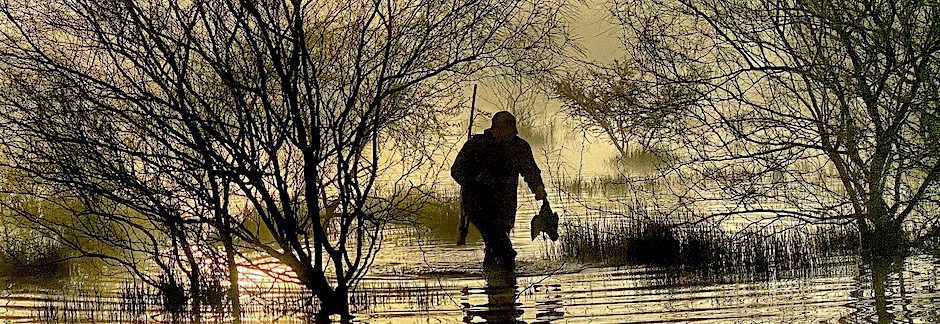MOJO’S Duck Season Somewhere Podcast
EP 399. Mississippi Outdoor Hall of Famers

A sign reads, “Rule Number 1: No tales told on this islands shall be repeated on the mainland!” The Mississippi Wildlife Heritage Museum in Leland, Mississippi, is a huge repository of stories from throughout the state. The Mississippi Outdoors Hall of Fame is located there. You don’t have to be from Mississippi to recognize some of the legendary names represented. Billy Johnson explains why he thinks Mississippians have influenced the entire US hunting industry, and what makes folks candidates. Good stuff.
Related Links:
EP 398. Texas Blue-winged Teal Hunting

It doesn’t happen by accident. A lot goes into making a successful, season-long blue-winged teal hunt like this reality. Today, Steve Biggers of Rocky Creek Retrievers Team Waterfowl explains the inner workings and introduces team members Marcus Lagrange, Tracey Andreas, Joey Hanks and Len Vaughn. In describing the 16-day Texas blue-winged teal season from their varied perspectives, you’ll understand why so many hunters migrate to this destination to hunt blue-winged “rice rockets,” and what the experience entails.
EP 397. Who is Ramsey Russell?

“I want to interview you,” it was stated while we were elbow deep into world-class Memphis BBQ. Continuing he said, “On your podcast, I mean. Because maybe some listeners don’t know who you are, where you come from, what you really do.” And so it came to pass that waterfowl historian Dr. Wayne Capooth put Ramsey Russell in the hot seat usually reserved for our esteemed guests.
EP 396. Mississippi Teal Opener with My People

The Mississippi teal opener was lackluster except for the fact that I was joined by both sons, Forrest and Duncan, and our long-time Mr. Ian for the first time in several years. We’ve shared Mississippi blue-winged teal and duck openers for nearly 20 years, since before the boys could shoot. Together again at camp, we recall past times.
EP 395. SPECIAL: Proposed Traffic Jam at Favored Alabama WMA

To alleviate burgeoning traffic, 10 possible traffic routes have been proposed for a new Tennessee River bridge in Decatur, a northern Alabama town. SIX proposed routes cut through Swan Creek WMA, favored by duck hunters for generations, directly and negatively impacting duck hunting in one of the only public properties available regionally. Regional Director Franz Schnabl, along with Alabama Delta Waterfowl volunteers James Moyer, Keaton Kenny, Connor Forteberry and Kylie Suchy explain the debacle and why it matters no matter where in the US you live and duck hunt! Sign the petition below!
Related Info:
EP 394. Behind the Levee

Behind the levee is magical; a wonderland if hunting and fishing wild, mostly untamable places in the Deep South is your thing. Long-time friend and storyteller, Jim Crews, takes us behind the levee, sharing stories from a special place his family’s now hunted for 4 generations.
EP 393. Let’s Go Fishing with Bill Dance

“Luring that fish from his world into mine was life changing,” remembers American outdoors legend Bill Dance when describing earliest fishing memories. It changed his life and many others, like myself, that have followed him since the 1970s. Bill Dance talks about his greatest influences, proudest accomplishments, getting started into professional fishing, life lessons, self-deprecating bloopers, and much, much more. His incredible wealth of treasured information and gifted storytelling will have you listening hook, line and sinker from the get-go.
EP 392. The South Africa Duck Hunt Collectors

Wingshooting South Africa is an amazingly immersive tour encompassing ducks, geese, and upland game birds spanning 3 provinces–from Jo’berg to the Indian Ocean–but what types of hunters does this half-way-across-the-world hunt attract? Are they trophy species collectors? Experience collectors? Are they since-forever seasoned hunters? Relatively new to the sport? Tune in as Ramsey wraps up an epic 11-day South Africa tour by visiting with a collection of hunters that are as unique as the numerous winged and spiral-horned fauna of South Africa itself. Their answer might surprise you. And inspire you.
Related Link:
EP 391. Atlantic Flyway Management Considerations

Atlantic Flyway mallard and Canada goose limits have doubled for the upcoming season! But why? US Fish and Wildlife Service’s Atlantic Flyway Representative, Patrick Devers, explains this and much more. Sprawling civilization and a broad array of species complicates waterfowl management in the Atlantic Flyway. In discussing issues and strategies, we fall headlong into topics involving differing adaptive harvest management models applied among US flyways, old world mallard genetic influences, black ducks, swans, brant, and eiders. Interesting episode for sure, and you might even learn a thing or three.
EP 390. Illinois River Decoy Carver

For Illinois River decoy carver, Pat Gregory, carving gunning waterfowl decoys is a family tradition that reflects where, what and how he, his ancestors and mentors have hunted waterfowl since way back when. He’s big into traditions and waterfowling history like that. While sitting in ankle-deep wood chips at his makeshift shop at Delta Waterfowl Expo, Gregory explains how his decoys and carving methods speak about him as a carver, hunter and human being. So why not just pitch plastic decoys? In true story-teller fashion, he chips away at the answer. Tune in to find out.








